Table of Contents
Eudaimonia is a hard word to define outside of its native Greek. It comes from the Greek words for “life” and “spirit” and effectively means “living the good life,” however it means “the good life” in a very particular way. The good life in this sense means living well, but also living good — that is to say, virtuously.
To live well is to aspire and to overcome one’s shortcomings, as well as to inspire those around you to greatness. We do this by searching for the core of our soul inside and then living in accordance with it’s will. There is, lurking in the very concept of eudaimonia, the idea that no one would do evil of their own will, but only out of ignorance.
It’s a stunning and life-affirming concept.
The concept of Eudaimonia begins with Socrates, passing through Plato and Aristotle and is then picked up again by Epicurus and the Stoics. It is the cornerstone of moral philosophy — how ought one to live?
Eudaimonia necessarily includes aspirations to become better tomorrow than one is today. Indeed, self-improvement is, in many ways, the means by which most people living today express their striving toward eudaimonia.
The quotes below come from great philosophers, writers and the Founding Fathers. What they have to say about the concept can help you to better understand this difficult to pin down idea.
Quotes About Eudaimonia and Living Your Best Life
Mark Twain
“Let us so live that when we come to die even the undertaker will be sorry.”
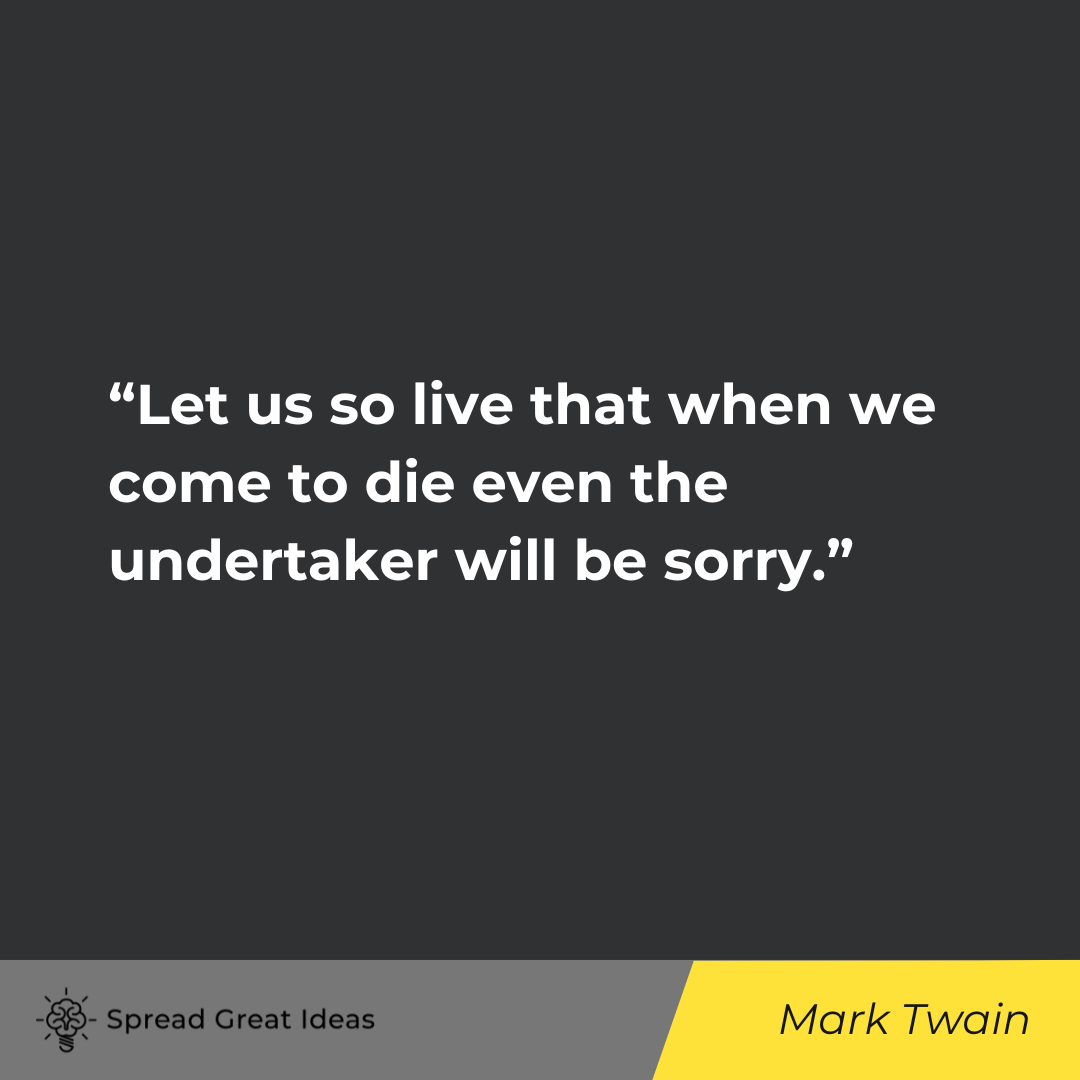
Mark Twain’s quote encapsulates the essence of a life well-lived, urging us to leave behind a legacy of such depth that even the most detached observer, like an undertaker, would feel a sense of regret at our passing. It speaks to the importance of living with integrity, kindness, and purpose. Twain challenges us to cultivate relationships, pursue passions, and make meaningful contributions to the world around us. By embracing this philosophy, we not only enrich our own lives but also leave an indelible mark on others, ensuring that our absence is felt with genuine sorrow and our memory cherished.
Matt Mullenweg
“If someone has those four things – work ethic, taste, integrity, and curiosity – I believe that you can learn anything in the world.”

In this insightful quote by Matt Mullenweg, he emphasizes the fundamental qualities essential for limitless learning: work ethic, taste, integrity, and curiosity. Mullenweg suggests that possessing these attributes empowers individuals to master any subject or skill. A strong work ethic drives consistent effort, while refined taste guides discernment and creativity. Integrity ensures principled conduct, fostering trust and reliability. Curiosity fuels exploration and growth, sparking a perpetual quest for knowledge. Together, these traits form a potent recipe for intellectual expansion, demonstrating that with dedication and the right mindset, the boundaries of learning are boundless.
Ayn Rand
“Happiness is not to be achieved at the command of emotional whims. Happiness is not the satisfaction of whatever irrational wishes you might blindly attempt to indulge. Happiness is a state of non-contradictory joy – a joy without penalty or guilt, a joy that does not clash with any of your values and does not work for your own destruction, not the joy of escaping from your mind, but of using your mind’s fullest power, not the joy of faking reality, but of achieving values that are real, not the joy of a drunkard, but of a producer. Happiness is possible only to a rational man, the man who desires nothing but rational goals, seeks nothing but rational values and finds his joy in nothing but rational actions.”
– Ayn Rand
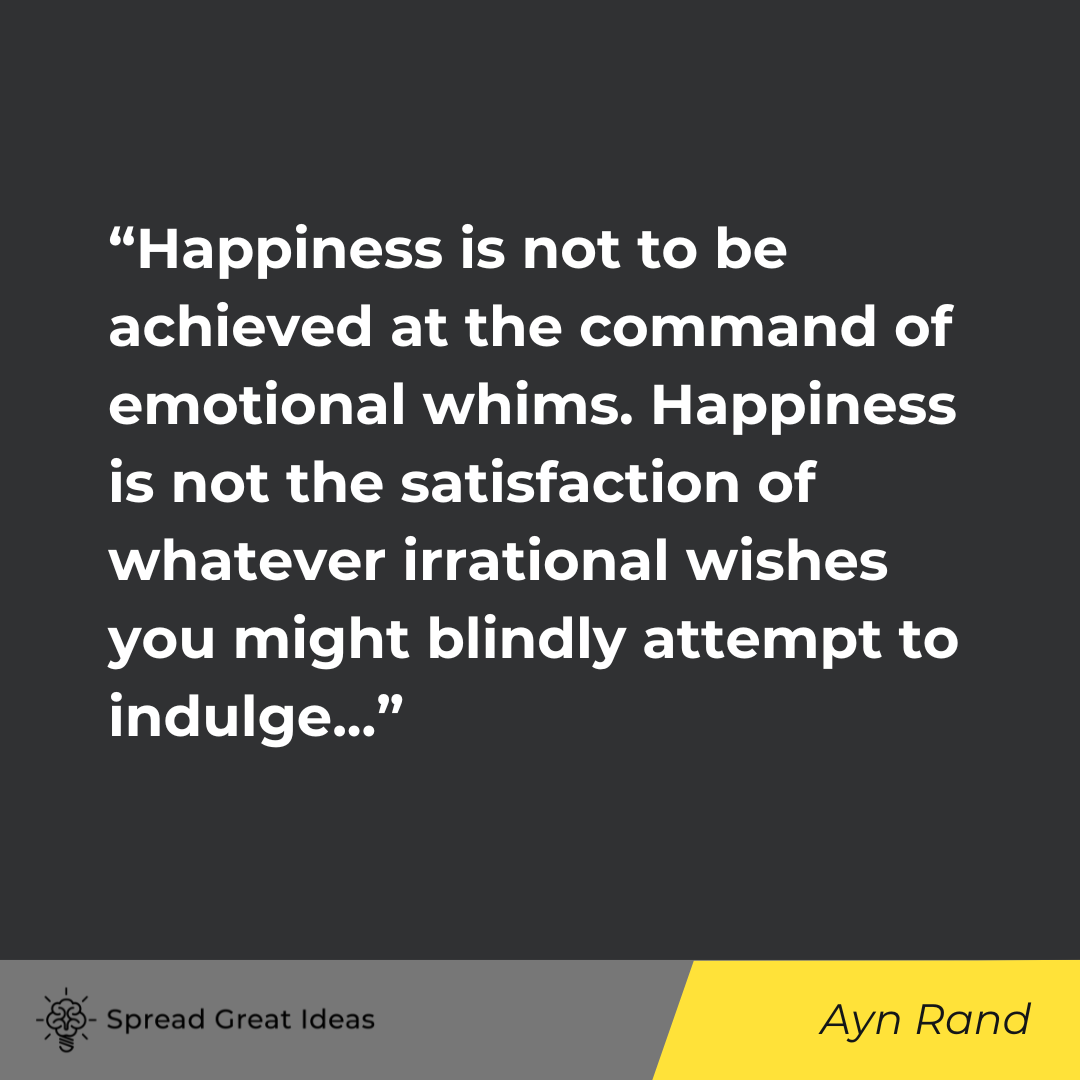
In this profound quote by Ayn Rand, she dismantles common misconceptions about happiness, asserting that it’s not a fleeting emotion dictated by impulsive desires. Instead, happiness is depicted as a profound state of non-contradictory joy rooted in rationality and alignment with one’s values. Rand emphasizes that genuine happiness arises from living authentically, pursuing rational goals, and achieving meaningful values. It’s not about escaping reality or indulging in hedonistic pleasures but rather about engaging fully with one’s mind and actions. True happiness, she argues, is reserved for those who live purposefully and ethically, finding fulfillment in the pursuit of rational ideals.
Paul Rosenberg
“Make your time on Earth matter; make your 90-year-old self proud.”
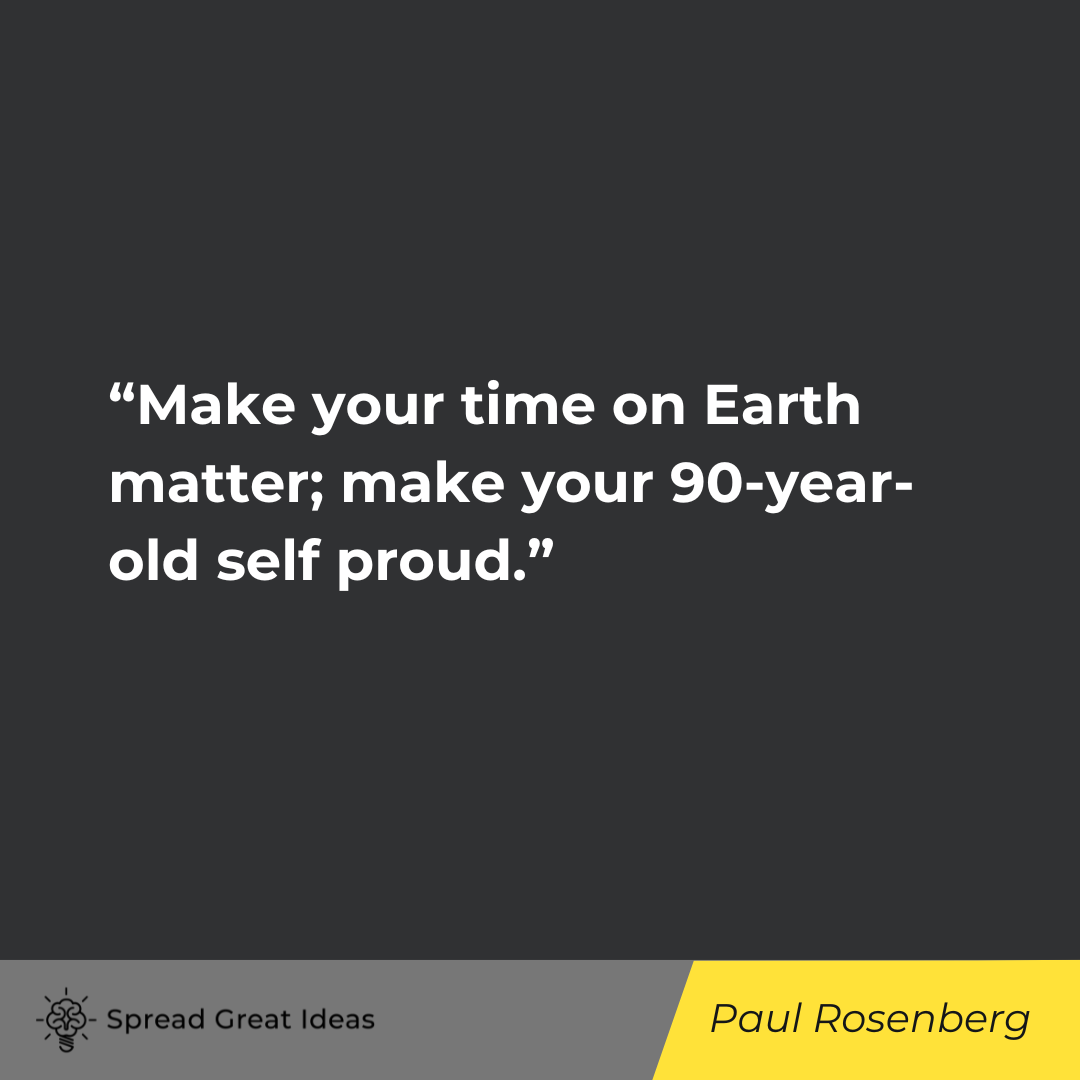
Paul Rosenberg’s quote encapsulates the essence of living a purposeful life with foresight and intention. It encourages individuals to consider their actions in the context of their long-term impact, aiming to leave a legacy that brings pride and fulfillment in later years. By envisioning oneself at the age of ninety, one is prompted to make decisions that contribute positively to personal growth, relationships, and contributions to society. This perspective fosters a sense of accountability and motivates individuals to prioritize meaningful pursuits, ensuring that the time spent on Earth is dedicated to pursuits that truly matter and resonate with one’s values.
Tecumseh
“Live your life that the fear of death can never enter your heart. Trouble no one about his religion; respect others in their views and demand that they respect yours. Love your life, perfect your life, beautify all things in your life. Seek to make your life long and of service to your people.”
“Prepare a noble death song for the day when you go over the great divide. Always give a word or sign of salute when meeting or passing a friend, or even a stranger, if in a lonely place. Show respect to all people, but bow to none. When you rise in the morning, give thanks for the light, for your life, for your strength. Give thanks for your food and for the joy of living. If you see no reason to give thanks, the fault lies in yourself. Abuse no one and no thing. For abuse turns the wise ones to fools and robs the spirit of its vision.”
“When it comes your time to die, be not like those whose hearts are filled with fear of death, so that when their time comes they weep and pray for a little more time to live their lives over again in a different way. Sing your death song, and die like a hero going home.”
– Tecumseh
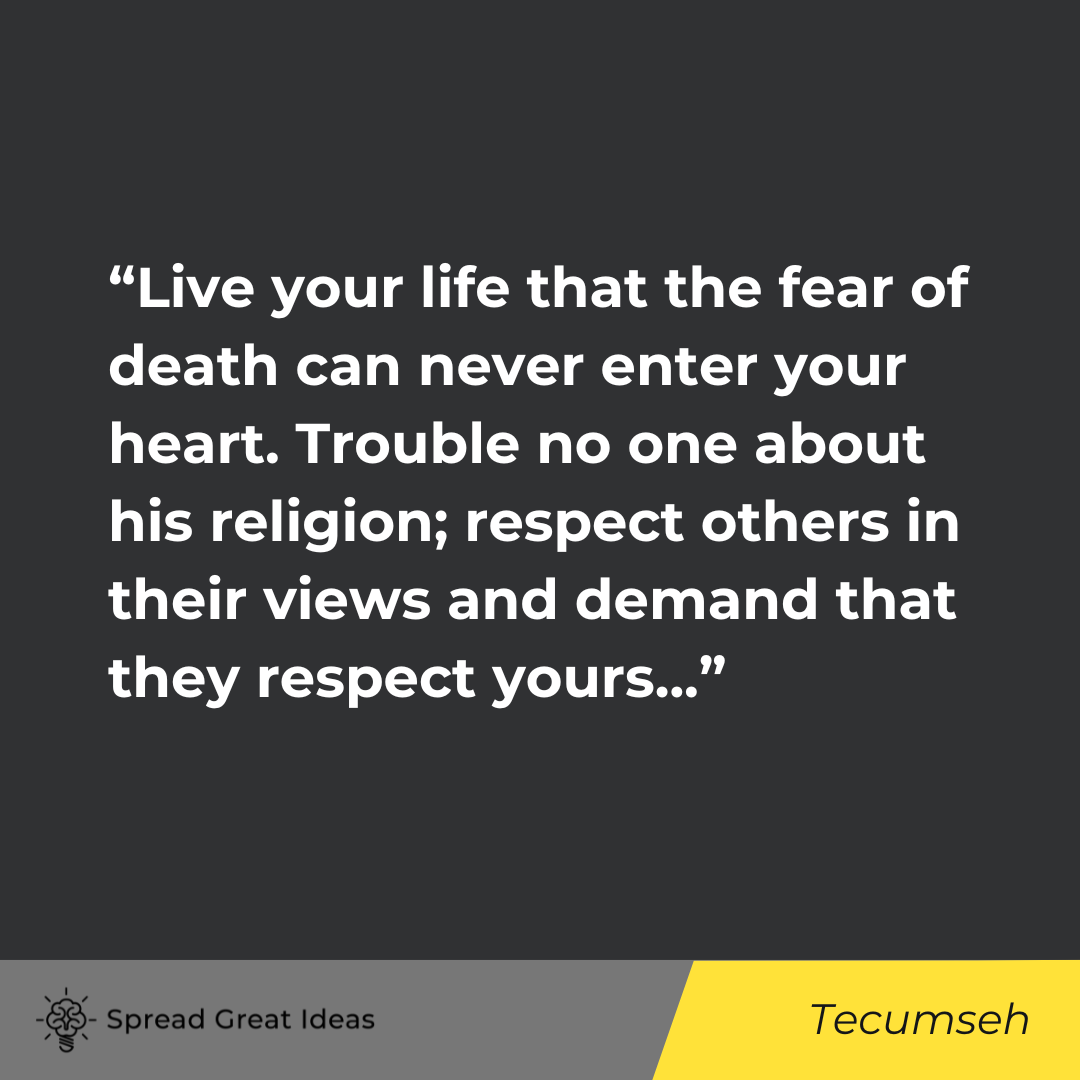
Tecumseh’s profound wisdom offers a blueprint for living a life of purpose, dignity, and respect. He advocates for a fearless existence, where the fear of death holds no power, urging individuals to embrace life fully while honoring their beliefs and those of others. His words inspire a commitment to personal growth, service to community, and gratitude for life’s blessings. Tecumseh emphasizes the importance of integrity, humility, and resilience, encouraging individuals to face mortality with grace and courage. Ultimately, his message resonates with the universal quest for a life well-lived, characterized by compassion, gratitude, and the pursuit of noble ideals.
Joseph Campbell
“Each person has a quiet place within himself. And it’s out of that that his action comes. If he or she as an athlete is all action, they’re not performing properly. There’s a center out of which one properly acts…There’s a center that has to be known and held by the person. But unless this center has been known and felt, you’re torn apart. Tension comes. The Buddha’s word for this is “nirvana”. Nirvana is a psychological state of mind. It’s not a place that’s not here. It’s not like heaven. It is here in the middle of the turmoil in what Buddhists call ‘Samsara’ – the whirlpool of life’s conditions. Nirvana is what? It is the condition when you’re not compelled by desire. Or by fear. Or by social commitments. When you hold your center, and act out of there. And like all heroes, the Buddha doesn’t show you the truth. He shows you the way to that truth. It’s got to be your way too. I mean how should you or I get rid of fear? The Buddha can’t tell me how I’m to do it. There are exercises which different teachers can give you. But all the teacher can do is give you a clue. A direction. They are like a lighthouse which says there are rocks over here. Best to steer clear.”
– Joseph Campbell, Season 1, Episode 1: Joseph Campbell and the Power of Myth – “The Hero’s Adventure”
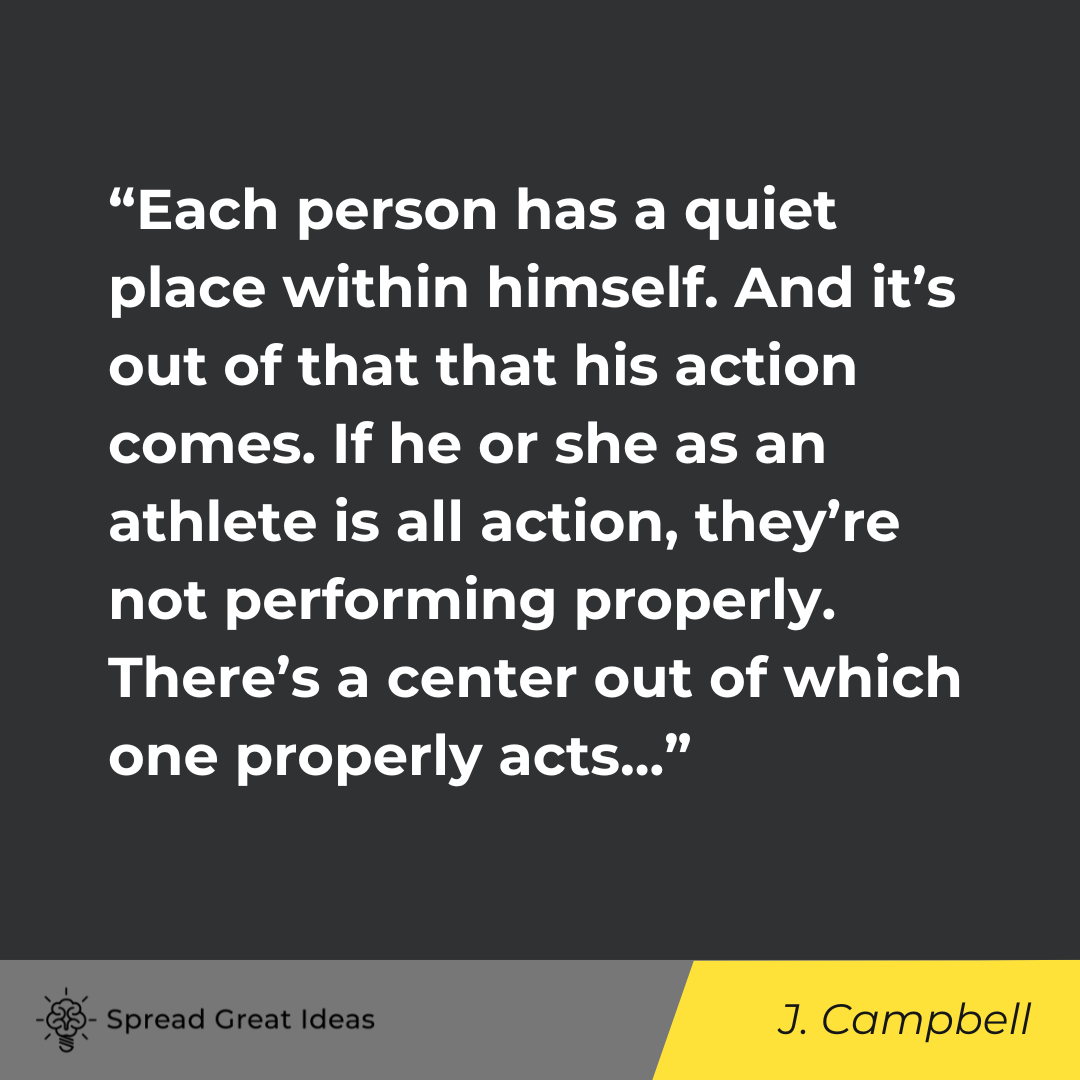
Joseph Campbell’s quote delves into the introspective journey each individual must undertake to find their true center and act from it. He illuminates the concept of a quiet inner sanctuary, from which authentic actions emanate. Campbell contrasts this serene inner state with the turmoil of everyday life, describing nirvana not as a distant paradise, but as a psychological equilibrium achieved amidst life’s challenges. He portrays the hero’s quest as a personal endeavor, emphasizing that while guidance can be offered, each individual must find their unique path. Campbell’s words serve as a beacon, guiding seekers towards self-awareness, courage, and liberation from inner constraints.
Immanuel Kant
“Morality is not the doctrine of how we may make ourselves happy, but of how we may make ourselves worthy of happiness.”
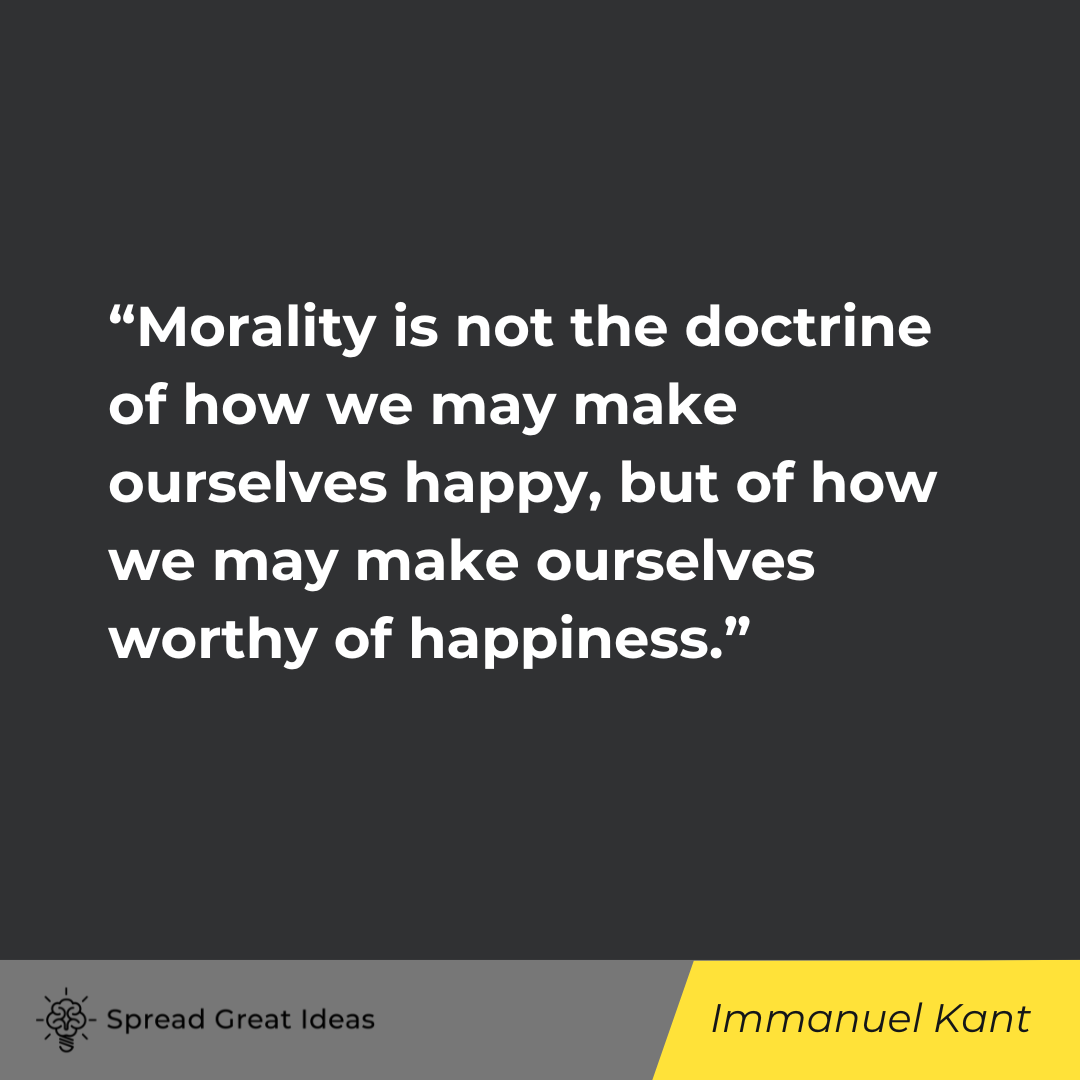
Immanuel Kant’s quote encapsulates a fundamental shift in perspective on morality. He argues that morality isn’t solely about pursuing personal happiness but rather about cultivating virtues that render us deserving of happiness. Kant emphasizes the importance of ethical behavior, suggesting that true fulfillment arises from living in accordance with moral principles, irrespective of personal desires. By focusing on becoming individuals of integrity, kindness, and justice, we pave the way for genuine and lasting happiness. Kant’s insight challenges us to prioritize ethical conduct and self-improvement, recognizing that true fulfillment lies not in self-indulgence but in the pursuit of moral excellence.
Marcus Aurelius
“Waste no more time arguing what a good man should be. Be one.”
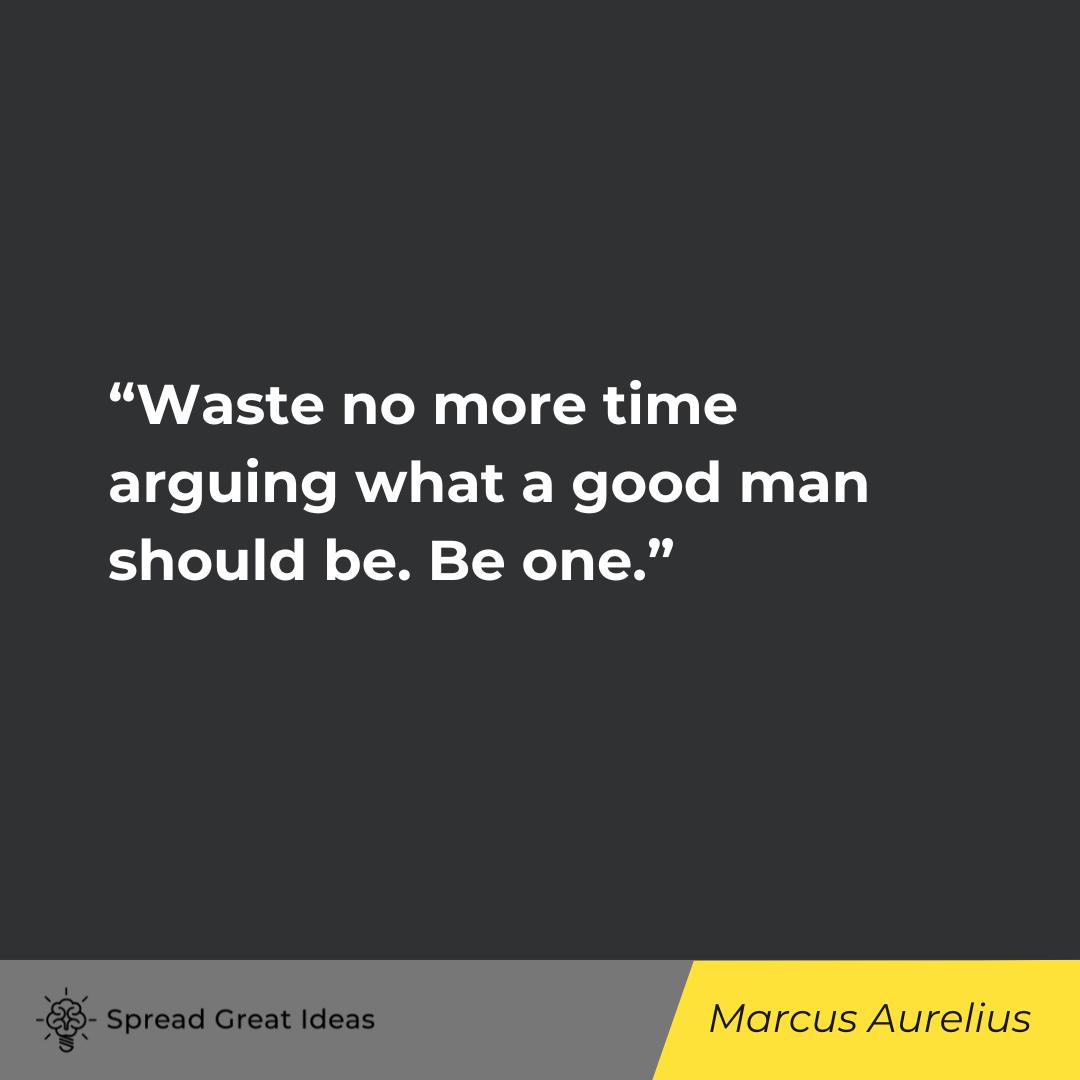
Marcus Aurelius’ quote is a call to action, urging individuals to transcend theoretical debates about morality and instead embody goodness through their actions. Rather than endlessly discussing the qualities of a virtuous person, Aurelius advises immediate implementation. He advocates for a life characterized by integrity, compassion, and honor, emphasizing the importance of personal responsibility in fostering positive change. Aurelius challenges us to cease deliberating and start living according to our highest ideals, recognizing that true goodness is not found in words but in deeds. This quote serves as a potent reminder to actively cultivate goodness in our daily lives.
Aristotle
“One swallow does not make a summer, neither does one fine day; similarly one day or brief time of happiness does not make a person entirely happy.”
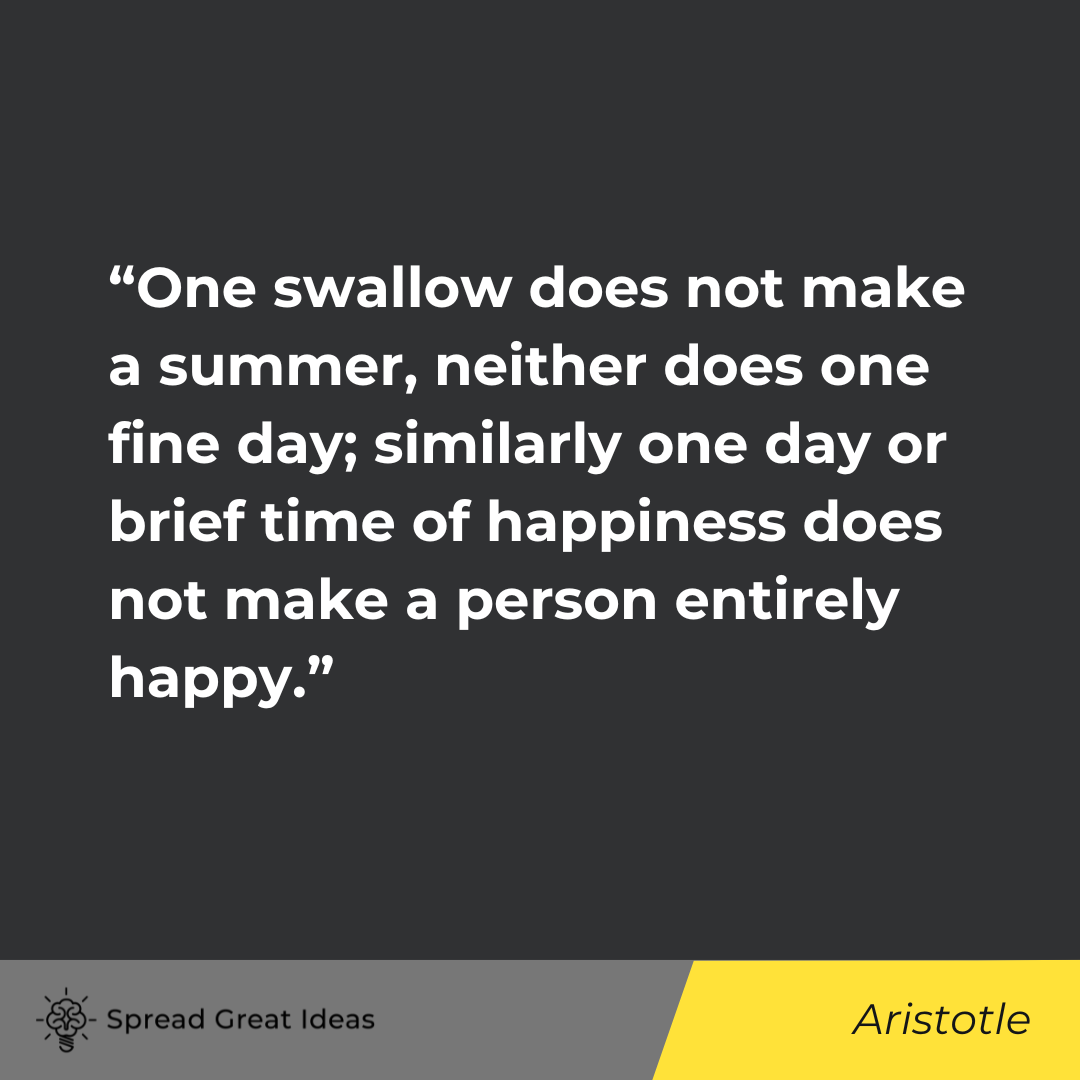
Aristotle’s quote cautions against drawing sweeping conclusions from isolated incidents. Just as a single swallow doesn’t signify the arrival of summer, fleeting moments of happiness don’t equate to enduring fulfillment. He underscores the need for sustained consistency and depth in one’s experiences to truly embody happiness. Aristotle highlights the nuanced nature of happiness, suggesting that it’s not a transient emotion but a state cultivated over time through meaningful pursuits and genuine connections. By recognizing the limitations of momentary joys, individuals are encouraged to seek fulfillment in lasting relationships, personal growth, and a life aligned with their values.
Aristotle
“These virtues are formed in man by his doing the actions… The good of man is a working of the soul in the way of excellence in a complete life.”
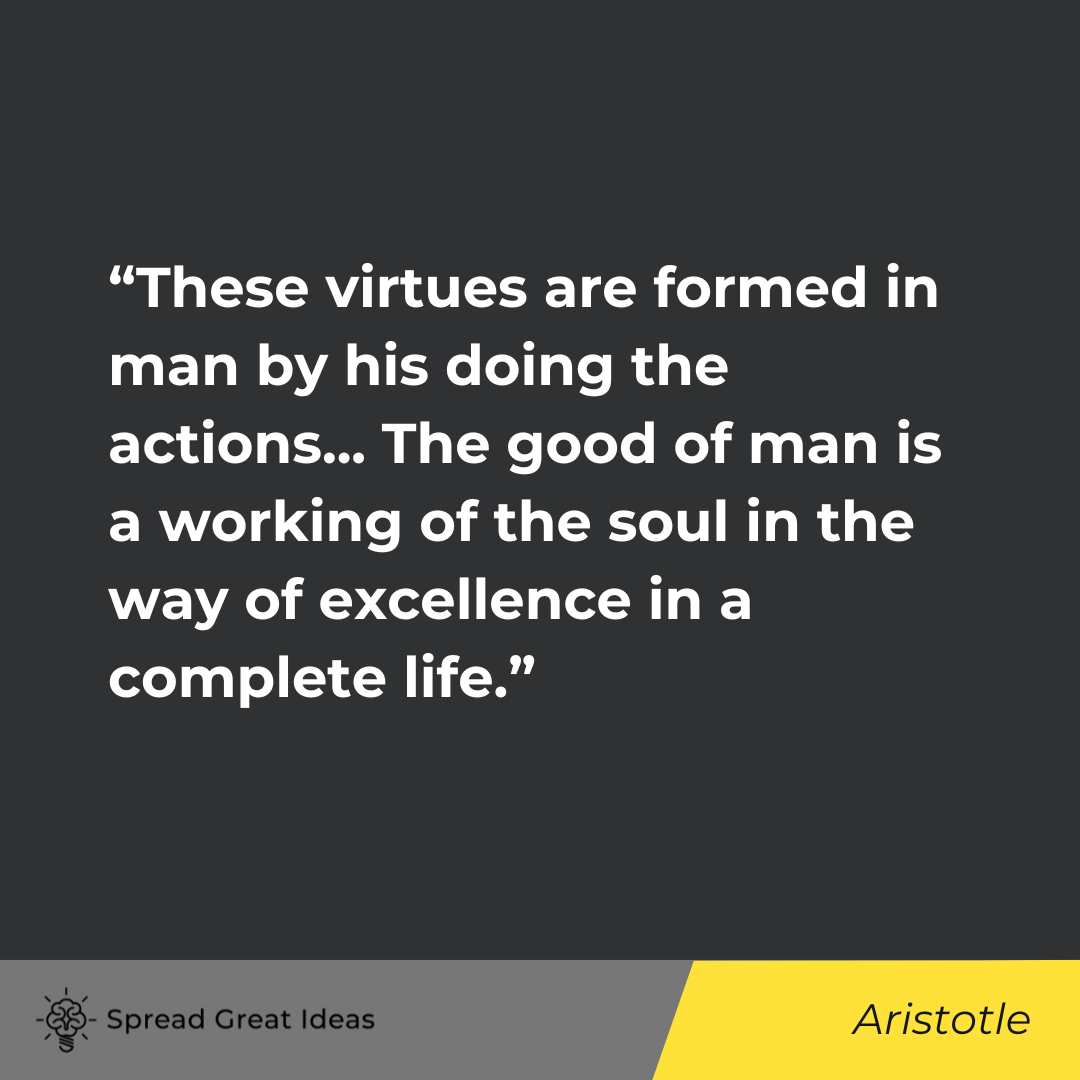
Aristotle’s quote elucidates the concept of virtue as a product of habitual action. He posits that virtues are not inherent traits but are instead cultivated through consistent practice and ethical behavior. According to Aristotle, the ultimate good for humanity lies in the realization of excellence through a lifetime of virtuous deeds. He emphasizes the integral connection between moral character and a fulfilling existence, suggesting that a complete life is one marked by the continual pursuit of excellence. This perspective underscores the importance of active engagement in shaping one’s character and ultimately achieving a sense of fulfillment and purpose.
Ralph Waldo Emerson
“Make the most of yourself…for that is all there is of you.”
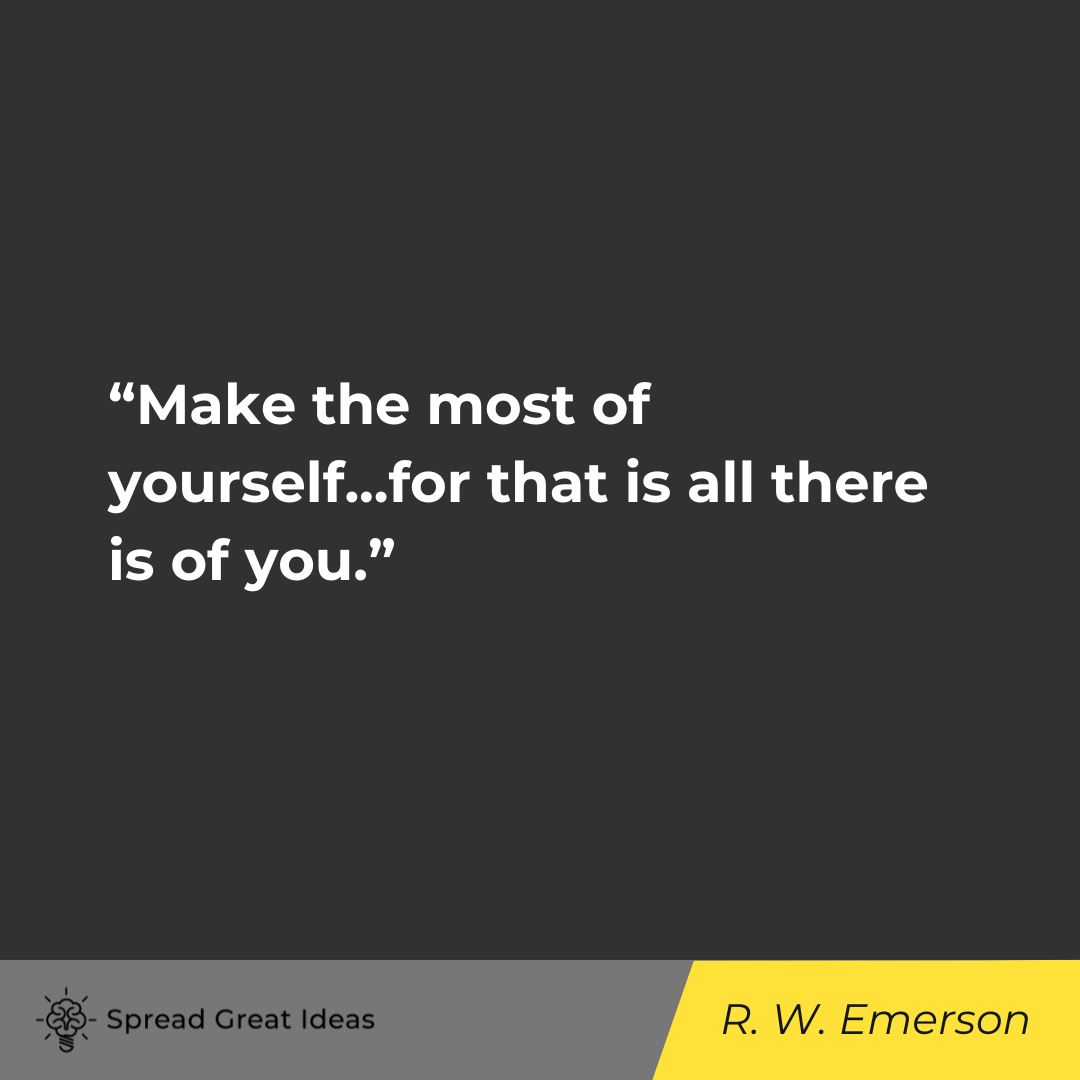
Ralph Waldo Emerson’s quote encapsulates a profound call to self-actualization and personal growth. He urges individuals to seize the opportunity to maximize their potential, emphasizing that one’s essence and worth are defined by their self-development. In this succinct admonition, Emerson highlights the significance of self-improvement as the essence of existence. He reminds us that our intrinsic value lies in our capacity for growth, learning, and self-realization. By embracing this philosophy, individuals are encouraged to embark on a journey of continuous self-discovery and actualization, recognizing that their greatest asset is the potential within themselves.
Hannah Arendt
“The ultimate end of human acts is eudaimonia, happiness in the sense of living well, which all men desire; all acts are but different means chosen to arrive at it.”
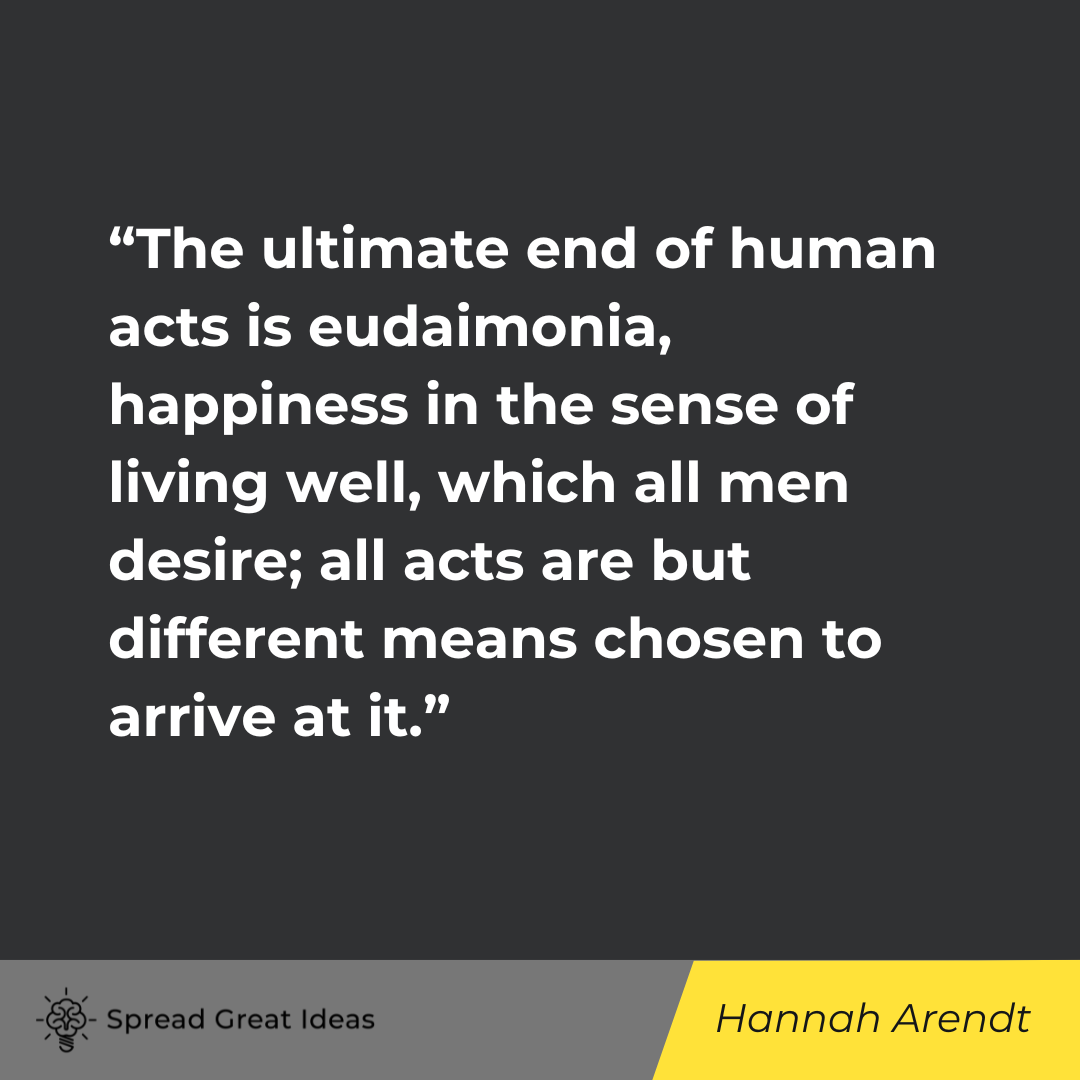
Hannah Arendt’s quote delves into the essence of human motivation, asserting that all actions are ultimately directed towards achieving eudaimonia, a state of living well and genuine happiness. She posits that this desire for fulfillment is universal among humanity. Arendt elucidates that while human endeavors may vary, they are all aimed at attaining this ultimate end. Whether through personal relationships, professional success, or intellectual pursuits, individuals navigate diverse paths in pursuit of eudaimonia. Arendt’s insight underscores the intrinsic human quest for a meaningful and fulfilling life, highlighting the diversity of means employed in the pursuit of this shared goal.
Derrick Jansen
“Eudaimonia is commonly translated as happiness, but I believe a more accurate translation would be fittingness: how well your actions match your gifts, match who you are.”
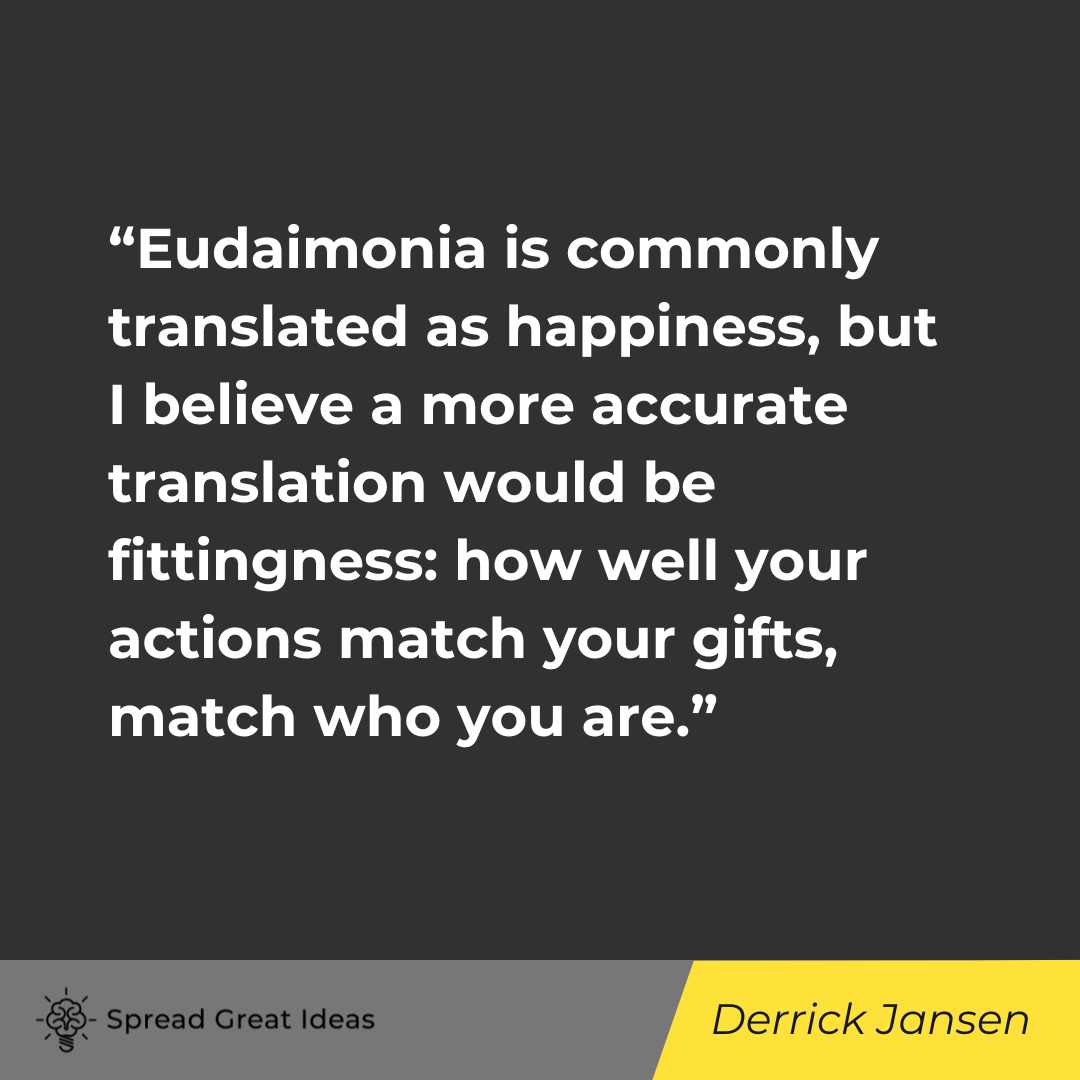
Derrick Jansen’s interpretation of eudaimonia offers a nuanced perspective, moving beyond conventional translations of happiness to emphasize a deeper alignment between actions and individual essence. He suggests that eudaimonia is better understood as “fittingness,” reflecting the harmony between one’s actions and their inherent abilities and identity. According to Jansen, true fulfillment arises not merely from subjective feelings of happiness but from a profound sense of resonance between one’s actions and their authentic self. This interpretation redefines eudaimonia as the realization of one’s potential and purpose, underscoring the importance of living in congruence with one’s true nature for a deeply meaningful existence.
Voltaire
“God gave us the gift of life; it is up to us to give ourselves the gift of living well.”
– Voltaire
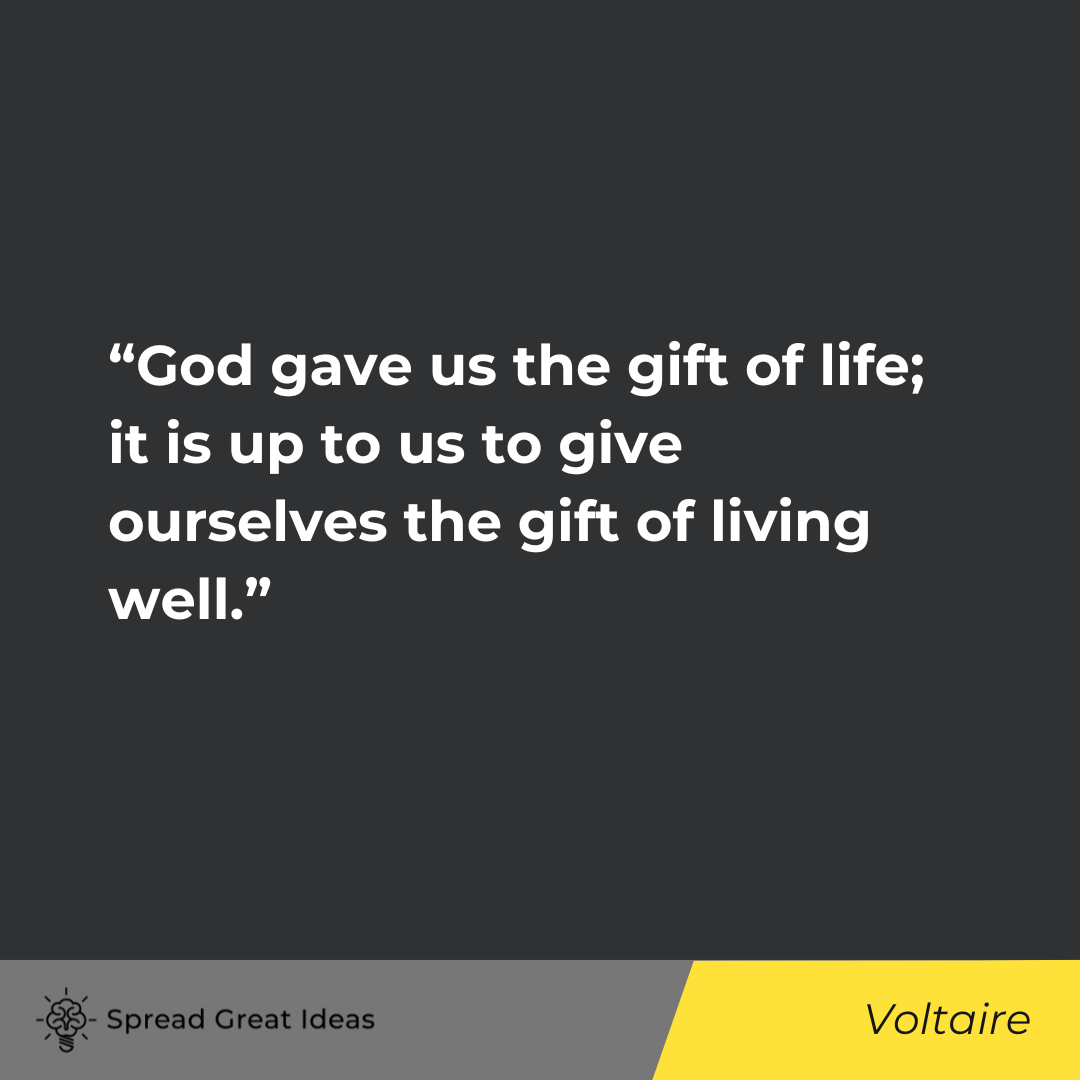
Voltaire’s quote encapsulates a profound truth about the human condition: while the gift of life is bestowed upon us by a higher power, it is our responsibility to imbue it with meaning and purpose. He emphasizes the agency we possess in shaping our own existence, urging us to seize the opportunity to live well. Voltaire suggests that true fulfillment arises from intentional living, characterized by virtuous action, personal growth, and the pursuit of noble ideals. In essence, he reminds us that the quality of our lives is determined not by external circumstances, but by our conscious choices and actions.
Cicero
“O vitae Philosophia dux! O virtutum indagatrix expultrixque vitiorum! Unus dies, bene et ex praeceptis tuis actus, peccanti immortalitati est anteponendus.”
– Cicero
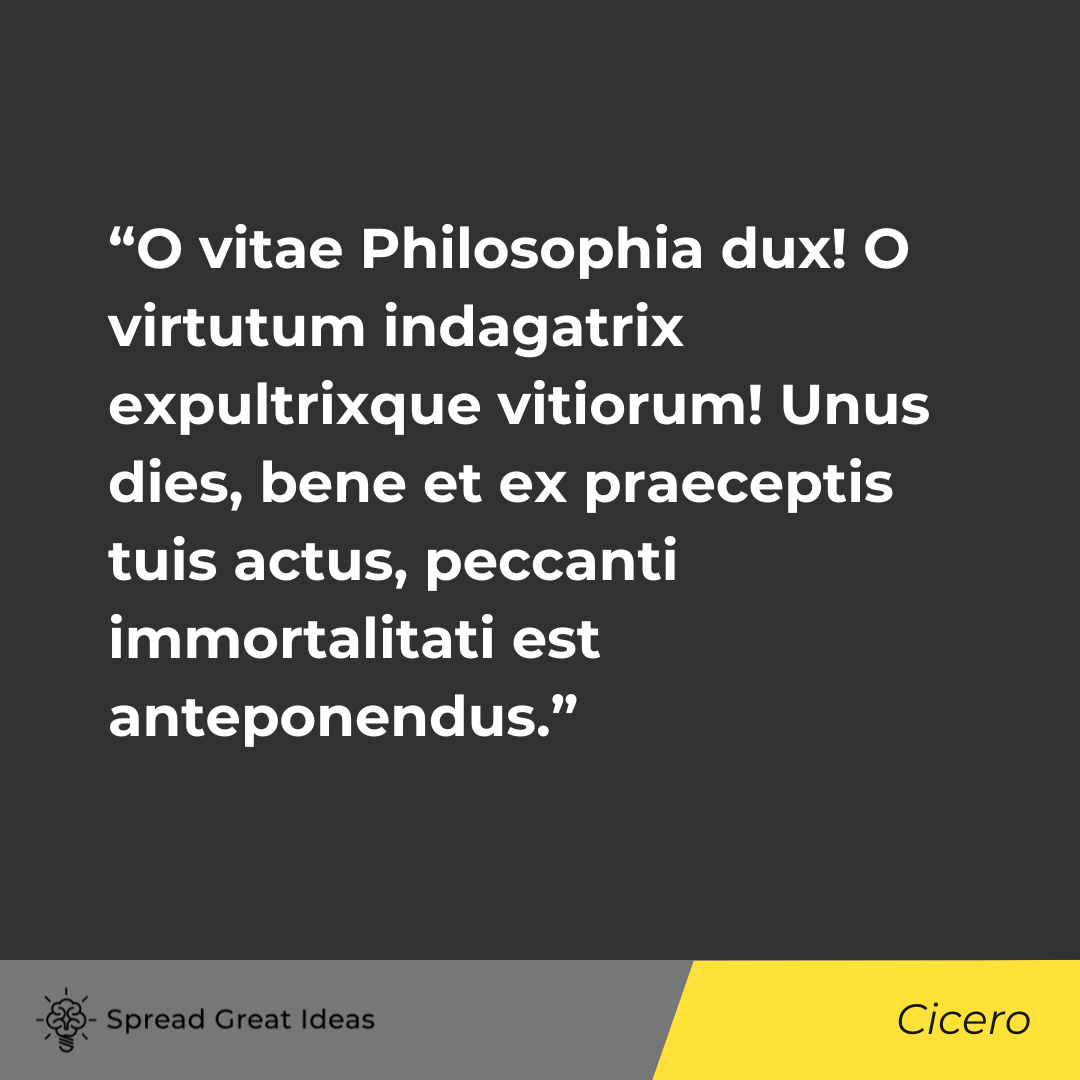
Cicero’s quote extols the value of philosophy as the guide of life, the seeker of virtues, and the expeller of vices. He underscores the transformative power of philosophical wisdom in shaping human conduct and character. Cicero asserts that even a single day lived in accordance with philosophical precepts is more worthy than an eternity of sin. This declaration emphasizes the profound impact of ethical living and the pursuit of wisdom on one’s immortal legacy. It encapsulates Cicero’s belief in the enduring significance of moral excellence and intellectual inquiry in the quest for a meaningful existence.
Benjamin Franklin
“O philosophy, life’s guide! O searcher of virtues and expeller of vices! Just a single day lived well and according to your lessons is to be preferred to an eternity of errors.”
– Benjamin Franklin, quoting Cicero in The Autobiography of Benjamin Franklin
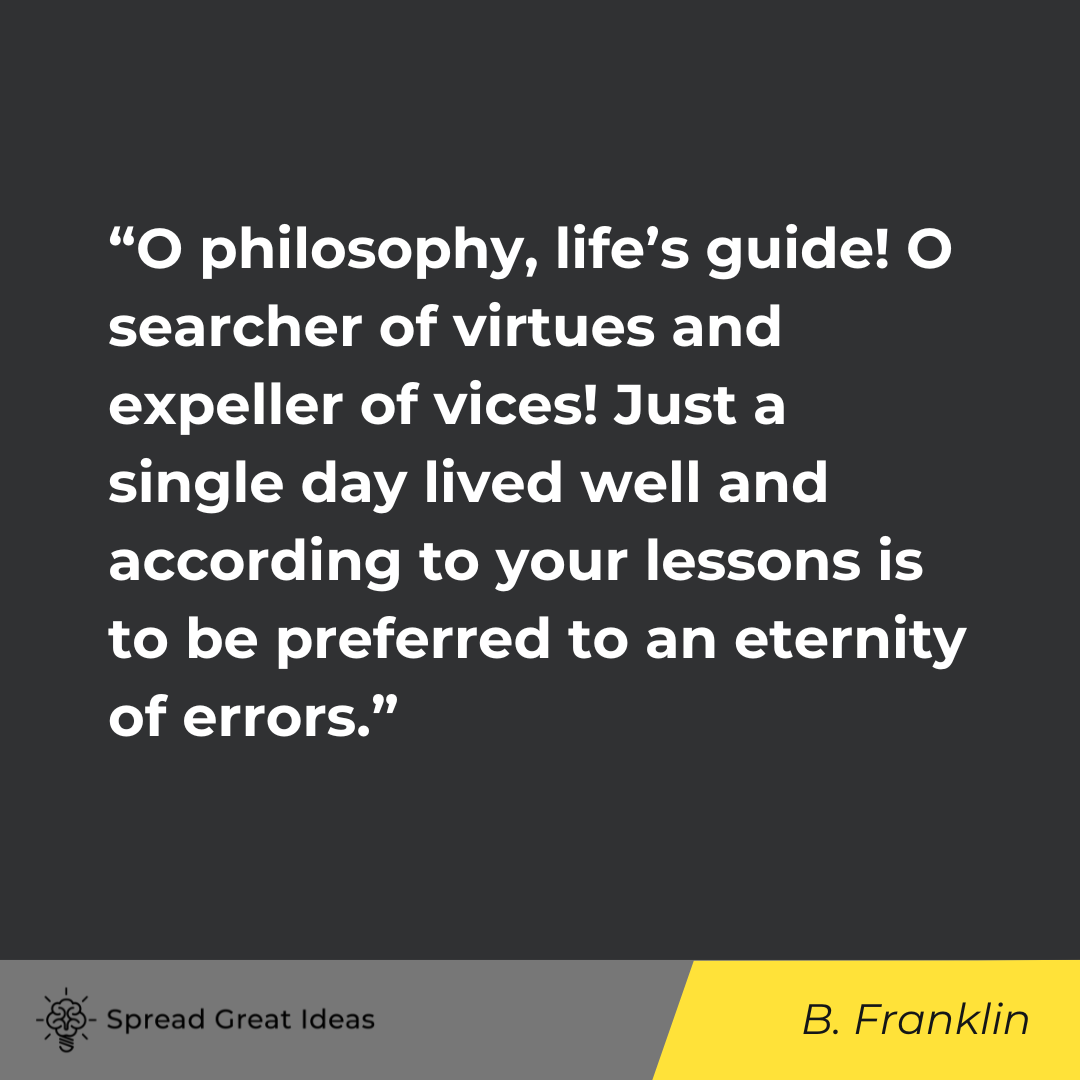
Benjamin Franklin, quoting Cicero in “The Autobiography of Benjamin Franklin,” echoes the sentiment of Cicero’s praise for philosophy’s profound impact on human life. He venerates philosophy as the beacon guiding existence, uncovering virtues and banishing vices. Franklin emphasizes the transformative potential of even a solitary day lived in adherence to philosophical principles, highlighting its superiority over a lifetime of missteps. This quote underscores Franklin’s reverence for wisdom, ethics, and self-improvement, reinforcing the notion that the pursuit of knowledge and virtuous living is the true path to a fulfilling and meaningful life.
Johann Wolfgang von Goethe
“One ought, every day at least, to hear a little song, read a good poem, see a fine picture, and, if it were possible, to speak a few reasonable words.”
– Johann Wolfgang von Goethe, Wilhelm Meister’s Apprenticeship
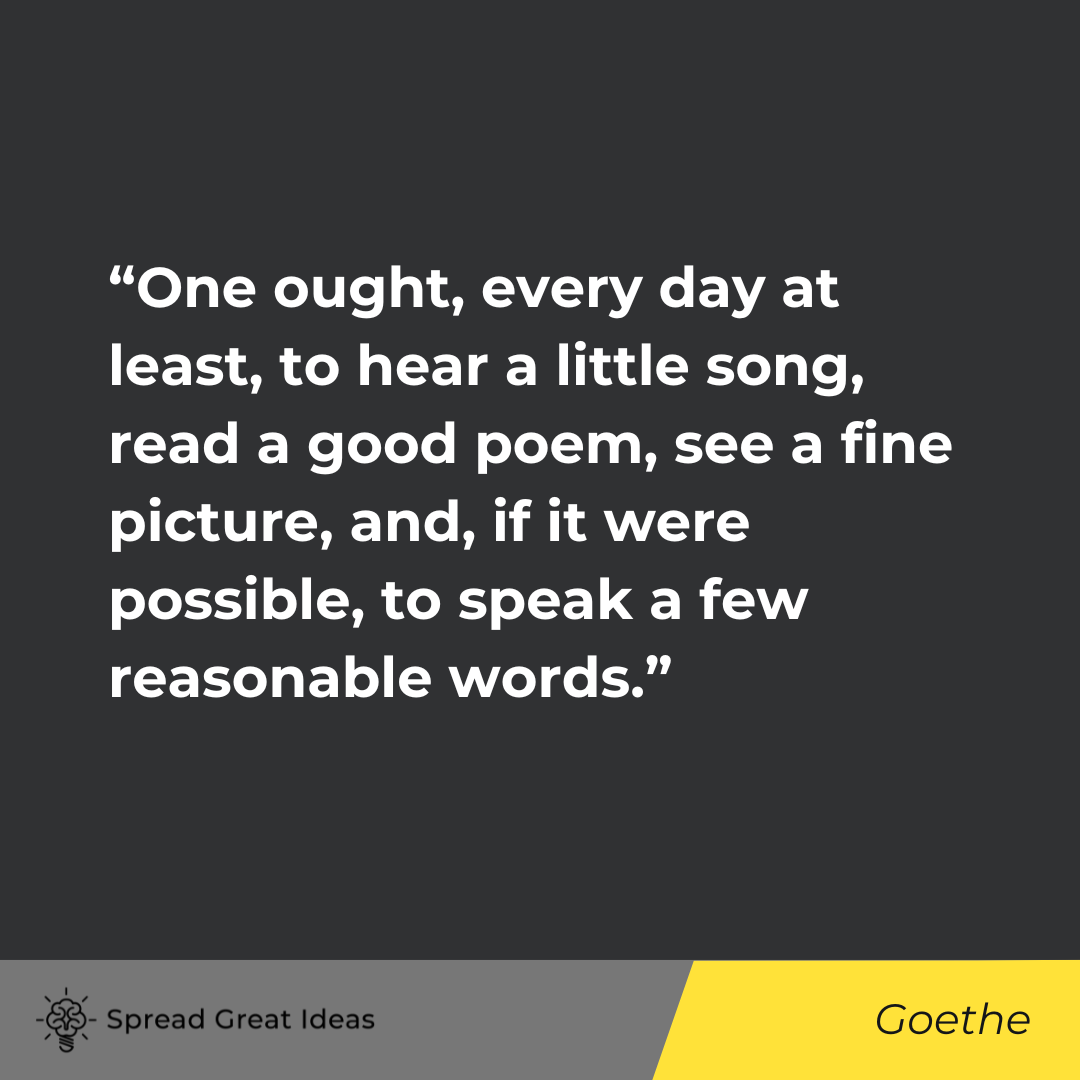
In this insightful quote from Johann Wolfgang von Goethe’s “Wilhelm Meister’s Apprenticeship,” he advocates for the nourishment of the soul through daily encounters with beauty and wisdom. Goethe suggests a daily regimen that includes indulging in music, poetry, visual art, and meaningful conversation. He recognizes the importance of these enriching experiences in fostering creativity, inspiration, and intellectual growth. By integrating these elements into daily life, Goethe proposes a holistic approach to self-cultivation, emphasizing the significance of balancing aesthetic appreciation with thoughtful discourse. This quote serves as a timeless reminder of the value of cultivating a well-rounded and fulfilling existence.
Franklin D. Roosevelt
“A nation that destroys its soils destroys itself. Forests are the lungs of our land, purifying the air and giving fresh strength to our people.”
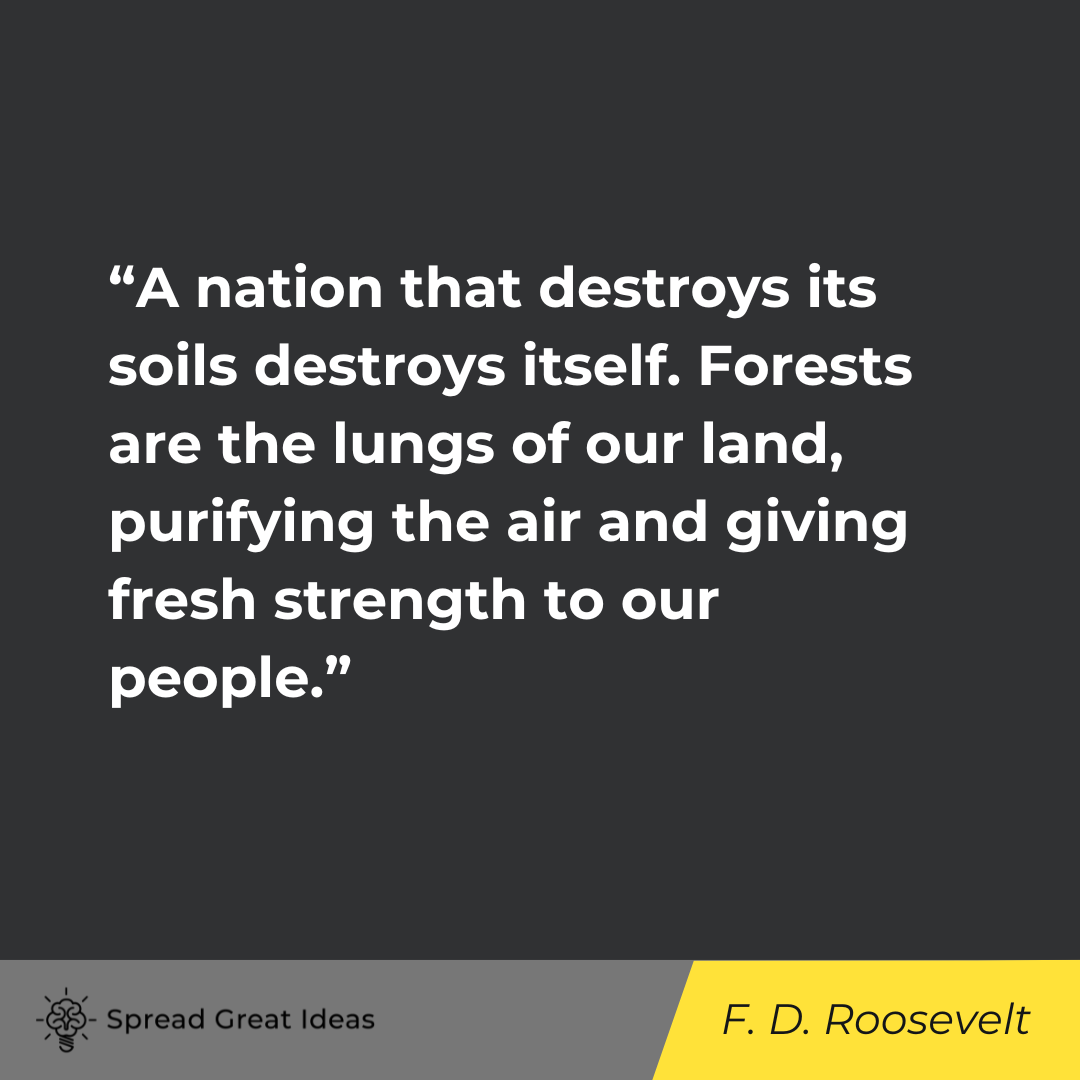
Franklin D. Roosevelt’s quote encapsulates the critical link between environmental stewardship and national prosperity. He highlights the profound interdependence between a nation’s well-being and the health of its natural resources, particularly its soils and forests. Roosevelt poignantly likens forests to the life-sustaining organs of the Earth, emphasizing their role in air purification and providing vitality to communities. By recognizing the intrinsic value of preserving ecosystems, Roosevelt underscores the imperative for sustainable land management practices. This quote resonates as a call to action, urging societies to prioritize environmental conservation as a cornerstone of long-term societal health and resilience.
